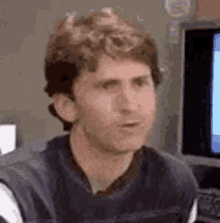Why Xbox believes it must cut costs and close studios
Companies, particularly public companies like Microsoft, need to grow.
Investors that put money, or buy shares, in a business want to make money on their investment. And for that to happen the company's 'value' needs to go up. It needs to grow bigger. Growth could be many things, but it typically refers to revenue (the amount of money a company generates) or profit (the amount of money a company makes after costs). And to investors, a loss-making company that is getting bigger every year is more exciting than a profitable business that is going the other way.
This may sound obvious, but we're about to get into why
Xbox just closed three Bethesda studios. And it's important to keep in mind that focus on growth. Because ultimately it doesn't matter how rich Microsoft is, or how much profit it's making, it's all about getting bigger.
Let's pop back in time a bit. Xbox as a business has had a rough ride over the past decade. Following the calamitous launch of Xbox One, the company saw its popularity in the console space drop substantially. It's been stuck firmly in third place behind Nintendo and PlayStation. But despite the fall in popularity, the Xbox business saw its revenue increase as the games industry became more digital. Still, for long-term success, Xbox knew it needed to find new customers if it wanted to compete more strongly. It needed a new plan.
With the backing of Microsoft's senior management, Xbox decided to try and change the game. Central to this was its Game Pass subscription business. The Xbox team believed that Game Pass would allow it to find new customers, generate more revenue and expand its business. And not just for itself, but the entire games industry.
For a subscription service to work, Microsoft knew it needed a regular release schedule of great games for people to play, and to do that effectively, it needed to significantly increase the number of games it was making. So it started to spend money picking up studios and franchises. At first, it was buying mostly mid-sized developers like Double Fine and Ninja Theory, or established partners like Playground Games. It was also investing in its own teams, expanding studios and forming new ones, such as The Initiative. This was all in service of creating a 'regular cadence of content' into Game Pass. But it was also about variety: Xbox wanted big games, small games, shooters, platformers, RPGs and so on.
After that initial spate of acquisitions, Xbox executives were talking about the need to acquire studios that were making games for different audiences. Xbox chief Phil Spencer would talk about a desire to buy a Japanese studio, which would help it find players in Southeast Asia. This Game Pass plan wasn't just about the US and Europe, it was also about Asia and South America. And for those territories, it would need to find games suited to the tastes of those players.
So it came as a surprise when the firm spent $7.5bn on Bethesda, a company best known for RPGs and shooters. Considering Xbox already owned Halo, Gears of War, Fable and had recently acquired the RPG specialist Obsidian, Bethesda didn't seem to fit the bill as a developer of different games for different audiences. It may not have been a strategic move, but buying Bethesda gave Xbox some huge franchises and a back catalogue of games that would provide a substantial boost to the Game Pass line-up. Although it's worth stressing that the bulk of that $7.5bn was for the likes of Elder Scrolls and Fallout, not Dishonored and The Evil Within. Microsoft's acquisitions would continue, eventually leading to that huge $69bn deal for Activision Blizzard.
(As an aside, although Xbox now had an abundance of developers, that wasn't quite translating to a huge number of major games - something likely down to Microsoft's relatively hands-off approach to working with newly acquired companies. Microsoft likes to adopt a 'limited integration strategy' when it comes to buying things. What that means is it leaves the company it's just bought to operate how it would have done, and only coming in and helping when asked. It was a strategy that worked spectacularly with Mojang and Minecraft, and how it approached the acquisition of LinkedIn. But I'd posit that allowing its teams to spend time building niche concepts like Bleeding Edge, Pentiment and Hi-Fi Rush has clashed with what Microsoft needed to grow Game Pass.)
Back to the main story. Xbox now had an abundance of studios and teams. It had a popular subscription service. It had two next-generation consoles, including the budget-priced Xbox Series S to attract a wider audience. And it was launching all its games on PC, too, to give it an even wider group of players to attract into Game Pass. But then the growth stopped. The Game Pass subscriber base stalled.
Microsoft had convinced as many Xbox players that it could to subscribe, so was now focused on getting PC players to sign-up. Some of this was due to the post-pandemic fall in engagement the games industry saw as people were no longer in lockdown at home. But also, there's the simple fact the subscription business may not appeal as widely as Microsoft had expected.
Although Microsoft believed subscription could broaden the audience for games and potentially transform the business in the way it had in TV and music, others were more sceptical. Take-Two CEO Strauss Zelnick observed that the average gamer only plays two to three new games a year, and that's not exactly enough to justify a subscription fee for a lot of people.
So Game Pass growth had largely stopped, and Xbox's traditional console business was also struggling, with sales trending behind Xbox One. To be fair, this growth situation wasn't just an Xbox problem. Most major games companies, including PlayStation, have seen a drop in users and sales in the face of a difficult economy. I covered a lot of this
in my article on layoffs, but suffice to say, the games industry has stopped growing for now. And as I set out at the beginning, that's not good news for a public business such as Microsoft.
It's a times like this when a corporation looks at what it's investing in and asks whether those areas are set to grow. It doesn't matter too much about what Redfall did or Hi-Fi Rush, but rather what was coming next. When growth is hard to come by, does it make sense for Xbox to invest in a Hi-Fi Rush 2, or would it see better results if it invested in a new Fallout instead?
Titles like Dishonored or even upcoming projects like Hellblade 2 do play a role for Game Pass in terms of fleshing out the line-up and giving its audience something else to play. But ultimately, these type of games could be signed-up via deals with other publishers, rather than developed internally. These games are also hard to monetise outside of Game Pass. Out of the four big games Xbox made last year,
Starfield was outside the Top 30 best-selling games in Europe, while Forza Motorsport, Hi-Fi Rush and Redfall all landed outside of the Top 200. And that includes the UK, where Xbox has a reasonable audience. In other words, these games are selling fewer units as a result of being in a subscription service.
Microsoft has been trying to monetise its games more over recent months and years, either via fees to access a game early or through in-game microtransactions. But although that can work for a blockbuster like Starfield, or a live-service effort like Sea of Thieves, it's hard to do with shorter, single-player titles like Ghostwire Tokyo. What Game Pass needs to move the needle are big games, titles like Call of Duty and Elder Scrolls. These are the 'high impact' games that are most likely to drive people to the service.
Regardless, Xbox is now trying to be less dependant on its Game Pass mission - and that's why we've started to see the company push harder into launching its games on multiple platforms. That includes continuing to support PC, it includes
launching an app store on smartphones (watch this space), and yes, it includes publishing more games on PlayStation and Nintendo consoles, too. The market may not be growing, but that doesn't mean Xbox can't find new people to play its games. And it's a far easier to simply go to where those people are already playing, rather than trying to convince them to come to you.
To properly succeed as a third-party publisher also requires big hit games. A platform holder will often invest in titles that doesn't make complete commercial sense, especially if it can bring in new players to its platform (and those new players might go on to buy other games or accessories). There's a reason Bayonetta didn't work for Sega but does for Nintendo.
But publishers need their games to perform well on their own merits and need to factor things in like platform fees and store marketing costs. Publishers - massive publicly-owned ones, anyway - are increasingly steering away from investing in expensive games that take five years to make, come out and then that's it. Microsoft now has an abundance of major games brands - Minecraft, Call of Duty, Diablo, Fallout, Warcraft, Halo, Elder Scrolls and so on - that live on well beyond their launch window, and it's these games that will drive the most success (and growth) for Xbox as a publisher. Therefore, it makes business sense to invest in these games (and the studios behind them) rather than a new Evil Within or Prey.
It all comes back to that growth. If Game Pass numbers were going up, if the Xbox consoles were competing more effectively with Switch and PlayStation, if revenue and profit were heading in the right direction, then perhaps Tango Gameworks, Arkane Austin and Alpha Dog would continue to exist. But the numbers are not going up.
Microsoft's latest financials painted a troubling picture for Xbox (once you subtract the Activision Blizzard figures, the numbers were going backwards). And as a public corporation, it will do the thing that these goliaths do, which is ask: 'What do we need to do to grow?' 'What parts of our business isn't supporting that?' And 'Should we be investing in something else instead?'
Put simply, Xbox bet an obscene amount of money on a future that hasn't happened. The market has shifted under its feet and it's having to alter direction. And some of its teams are having to pay the price.







































